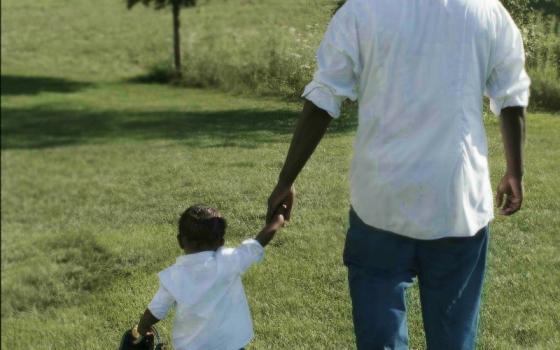An important lesson in my life is one that I'm still learning. It involves welcoming and trusting God as a loving father, rather than as a severe judge or "divine tester."
My own father started me down the track of this lesson. Once, when I was quite young and probably came home with some catechism lesson about heaven and hell, my dad said with great conviction, that as a father he could never consign any of his children to unending torment — that is, to hell. So hell, or a vengeful punishing God, just didn't make sense to him. Something was wrong with that picture. His conviction was an awakening for me.
Growing up with all things Catholic, I heard and read the stories of many saints. Stories of the martyrs, eager to die for God, seemingly in the more torment the better. Stories of the ascetics, punishing themselves in all kinds of ways, apparently just to prove their love of God.
Conclusion? If one wanted to be holy or grow in the love of God, doing the harder or more painful thing was the way to go. I tried — sporadically, lukewarmly. But there came an evening when an inner voice "spoke" with certainty, telling me that was not the way.
God did not want my feeble attempts at suffering for his sake. Amazingly, that was the end of such efforts on my part. It was a conversion, solid and sure, from which I have not waivered.
Years later, during a retreat I found myself wrestling with the whole idea of God the Father sending Jesus to Earth to suffer and die. What sort of father would intentionally send his son into a situation where he would be tortured and killed? Worse yet, what sort of father would do that and claim it was somehow evidence of his love?!
I tried to imagine my way out of this dilemma, and my imagination suggested that Jesus had come to live among us in love, but things were turning out badly for him. Still, he wasn't sorry that he'd come, and he didn't want his father to take vengeance on the folks who were about to kill him.
The Father wasn't punishing Jesus because we'd sinned. Jesus was persisting in love for us despite the suffering that we, that sin, can cause in human lives.
The last straw, perhaps the peak lesson on my path of learning, came at a time when I was having a very difficult time in a relationship with another person. I prayed and pleaded and tried to find peace, but nothing seemed to change.
Then, one day when I felt particularly distraught, I found myself yelling at God (yes, out loud) that "my father wouldn't do this to me."
And there it was. Right out there, reverberating in the air, echoing in my own ears. My father wouldn't do this to me, and God my Father wasn't doing this to me either. I was doing it to me.
I was working myself into a frenzy of worry and fear. God wasn't in the worry and fear. God was love, and if I could relax into a little love, things might not be so tense. Aha! Situation solved? Not exactly. But panic pushed away, and the presence of God detected? Yes.
These four experiences stand like milestone markers on my continuing journey away from the terrorizing judge image toward the cherishing fatherly image of God.
Is there suffering I don't understand — my own and certainly that of others? You bet. But I reject the idea that God causes or sends such suffering.
We humans, including me, are sadly capable of causing suffering and pain. God is busy going through it with us, trying to teach us how to avoid afflicting ourselves or others, and encouraging us when we act with patience or mercy or love in relation to our neighbor or ourselves.
Try watching a father with an infant. Holding, burping, rocking, making faces, provoking laughter, soothing, even scolding sometimes: That's God with us. Oh, we may be "grown," but God is so much bigger. The differences in size and power and knowledge — and love — between a father and his child are the smallest fractions of the differences in size and power and knowledge — and love — between God our Father and us.
And look at that child with its father. Resting, squirming, fighting against, yelling, hugging, laughing, clinging: That could be us, that could be me with God. God knows, I do it all — rest and squirm and fight and hug and yell and laugh and cling. Like a patient father, God puts up with it all, delights in a lot of it, and loves me, loves us.
The father doesn't weigh his love for his child; he simply loves. The child doesn't think about trusting its father; it simply does. Oh, is that what Jesus meant about "unless you become as little children"? Hmmm. I'm still learning.
[Joy Clough is a retired Sister of Mercy living in Chicago serving as a volunteer and author. From ministry as a high school English and journalism teacher, she became a writer of histories, director of communication for the Sisters of Mercy, and director of the office of public information for the Chicago Archdiocese. She served as assistant to the president at Saint Xavier University, and she was president of her congregation. Since then she has held various positions in the university's office of mission and heritage.]

